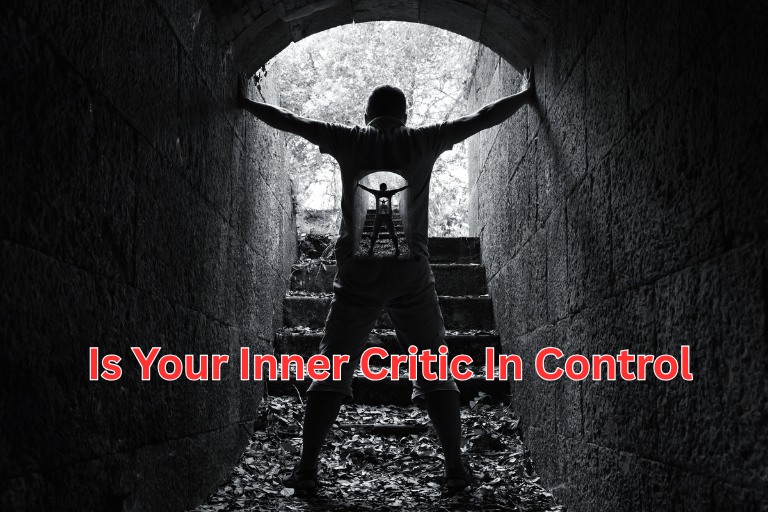Meet Your Inner Critic! The Voice That Holds You Back
Is It Really You?
Years ago, I was in a weekend pottery class.
The instructor gave a beautiful demonstration, and then it was our turn. My first attempt was a wobbly, lopsided disaster that collapsed into a sad mound of clay.
I laughed it off, but as I started to try again, a quiet but familiar voice popped into my head.
"You're terrible at this," it said. "Look at everyone else; they're getting it. You don't have the knack. Why even bother? You’re just going to embarrass yourself."
Now it wasn’t fun anymore. All I felt was anxiety and self-consciousness.
It’s a voice I know well, one I’ve heard in job interviews, before difficult conversations, and when trying anything new.
Do you hear that voice?
The internal narrator casting doubts on your abilities, questioning your worth, and second-guessing your choices.
The Inner Critic.
Understanding this voice. Where it comes from, and what it’s trying to do, is one of the most liberating things you can do for yourself.
The Misguided Protector in Our Minds
I used to think that voice was telling me "hard truths."
But here’s what I know from my journey and insights into psychology: that inner critic isn’t you.
Yes, it’s a part of you, but its origins are often rooted in a misguided attempt to keep you safe.
Think back.
At some point in your life, you learned that being too bold, making a mistake, or showing imperfection could lead to pain.
Being teased at school, criticized by a parent, or facing rejection.
Your brain, in its effort to protect you from getting hurt again, created this inner critic to act as a "protector."
It adopted the strategy of warning you to stay small, not take risks, be perfect, all to avoid that past pain.
The whispers start up, "You’re not good enough," or "People will think you’re a fraud," not because it’s inherently mean, but because it’s desperately afraid that if you step out of line, you’ll get hurt again.
What Listening to This Voice Will Cost You
The irony is that while this inner critic thinks it’s keeping you safe, it’s keeping you in a self-imposed prison. It’s a classic case of the solution being worse than the problem.
It fears failure, so it convinces you not to start new projects, leading to procrastination.
It fears rejection, so it wants you to hide your true self and your best ideas, discouraging authenticity.
It anticipates every flaw, so it demands impossibly high standards, leading to chronic perfectionism.
For me, this voice has been the source of so much unnecessary anxiety.
It shaped my choices without me even realizing it was a distinct pattern.
Play it safe, don’t apply for things I was qualified for, and judge every accomplishment as a fluke. A classic sign of imposter syndrome.
The saddest part is how many walk through life believing this critical voice is the absolute truth.
From Critic to Curious Observer
So, what do you do?
Fighting the critic head-on, telling it to "shut up," often makes it louder.
You’re wrestling with a shadow.
I've found the best way is changing my relationship with it, meeting it with awareness and curiosity instead of doing battle.
Notice and Name It: The first step is noticing when the voice shows up.
It might be when you get feedback at work or when trying something new.
Just notice it.
It also helps to name it "The Judge," "General Worrywart," whatever fits your personality.
Sounds simple, but naming it does something profound: it separates the voice from YOU.
Get Curious, Not Furious: Instead of immediately buying into the criticism or getting angry at the voice, try asking it a few gentle questions.
"What are you afraid will happen right now?"
"What are you trying to protect me from?" This will feel strange at first, but this approach reframes the critic.
It’s no longer a monster to be slain, but a scared part of you trying to help, albeit in an unskillful way.
Rewriting the Internal Script
Once you create that space and understanding, you can intentionally develop a different inner voice. One that’s compassionate and encouraging.
This isn’t about delusional, toxic positivity, where you ignore reality. It’s about talking to yourself with the same kindness you would give a good friend who was struggling.
This compassionate voice isn't weak; it's your inner champion.
And the more you consciously practice activating it, the stronger and more automatic it becomes.
Be Who You Really Are
What might you accomplish if that inner critic wasn't running the show?
What risks would you take? What ideas would you share? The truth is that the critical voice may never disappear entirely.
But it doesn't have to be in charge.



"At some point in your life, you learned that being too bold, making a mistake, or showing imperfection could lead to pain." This resonates with me. Well done article that can help many people out there. Thanks for sharing